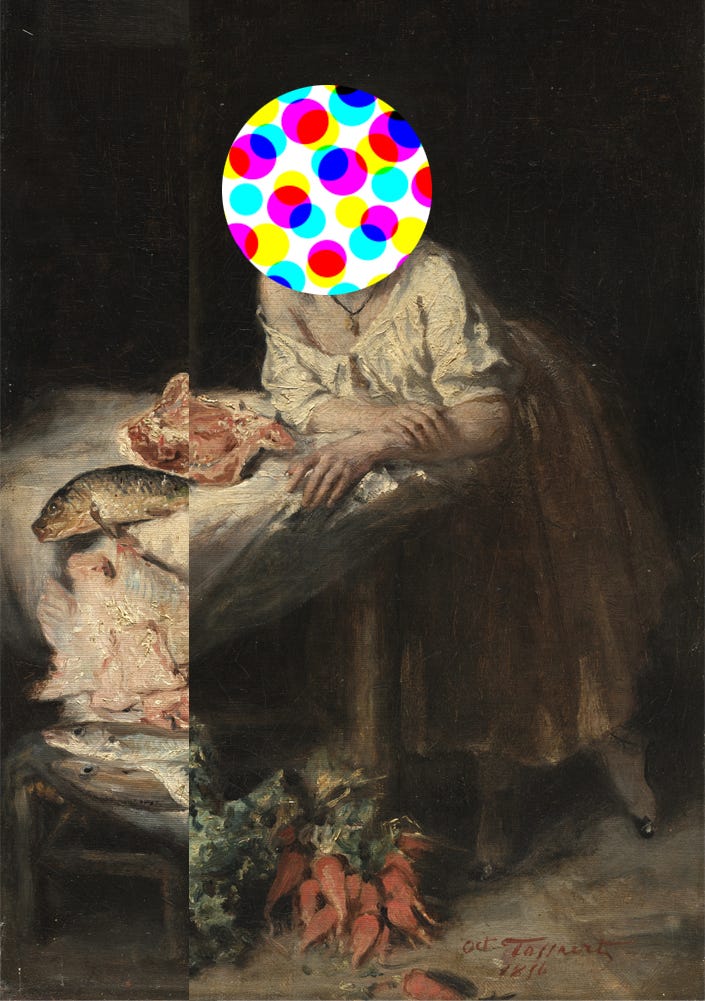By Nathan Chen
There are some activities the wealthy occasionally lust after. But there is one they will never stop avoiding.
Koichi gripped his chef’s hat as the metal hand centered itself above the ingredients on the bamboo mat. The fingers twitched with faint whirs as they calibrated. His eyes followed the hand to its arm encased in white plastic, protruding awkwardly from the wall. It was tempting to envision a body on the other side, but Koichi knew from service repairs there were only gears and hydraulics. The mechanical whirs stopped and the hand descended.
Each main ingredient was in a distinct pile; foie gras, unagi, avocado, and sturgeon black caviar. A sheet of dried seaweed and a bowl of rice sat to the side. As the hovering hand lowered, steel blades emerged out of the point of its fingers. In a series of surprisingly deft and fluid movements, the ingredients were portioned, squeezed together, rolled, and cut. The set of sushi was pushed in front of Koichi, the pieces themselves in a straight line with their faces tilted away from him. Koichi knew if he measured the angle of their tilt, he would find it to be a perfect 45 degrees.

Despite knowing no one was watching, Koichi nodded in approval. He was gazing at the final dish when colorful boxes popped into his vision, surrounding the sushi.1 They showed the source of several ingredients; the farm where the avocado was picked, the facility where the sturgeon was bred. Koichi angrily blinked thrice and the advertisements disappeared. He was annoyed — his new AR lenses meant everything was a QR code now. Let’s just get it over with, he thought.
Koichi placed one of the slices in his mouth. It was faultless like the many others before it. He dolefully gazed down the line, at the hundred-or-so disconnected arms. Picking up a trash bin, he swept the remaining sushi off the table. His work here was done.
This would be his last act as a chef. Part of him yearned to continue, but he knew the world had no place for him anymore. There were too few restaurants remaining. After months of unemployment, he had previously signed as a personal chef under the UniKitchen franchise. His contract required him to work alongside their proprietary AR tool. Its interface provided cooking instructions down to a few shakes of pepper or the last strokes of parmesan against the grater. Translucent lights led his hands through the motions of cutting, stirring, and tossing. In this way, the variation between each dish and UniKitchen’s original recipe was minimized. He left after a month and decided to sign the facility training contract soon after.
Better to help build the machine than become one. As he walked toward the facility’s exit, he looked back and paused. There would always be a wisp of his spirit here. He noticed an avocado sitting at a nearby station and picked it up, squeezing thoughtfully.
A large advertisement suddenly overtook his vision.
Farmed by the nourished. Find wholeness in a timeless activity.
His fingers broke through the skin of the avocado in surprise. He began to blink rapidly — then stopped. It was the farm that the avocado came from. It seemed to also be some sort of luxury retreat for city dwellers.2 But it was the text at the bottom that had caused Koichi to stop:
Chefs wanted.
The ad used an image of a chef standing next to the table of a young, smiling couple. Koichi chuckled. He placed the avocado in the pocket of his apron and walked out the door.
Footnotes
-
Grandma Flair: A food advertisement that delights you about the real food that you are eating. If the food you are eating has fewer than five ingredients or ingredients that you can pronounce, it fills the space with colorful delight. ↩
-
Farming Retreats: In the year 2025, as the “always-on” mode of being constantly connected to work (via smartphone, internet, etc.) becomes passe and low-class, large midwest farms place full page advertisements in the New York Times for wealthy urbanites to come pick fruit and other crops as a type of retreat from busy urban life. ↩